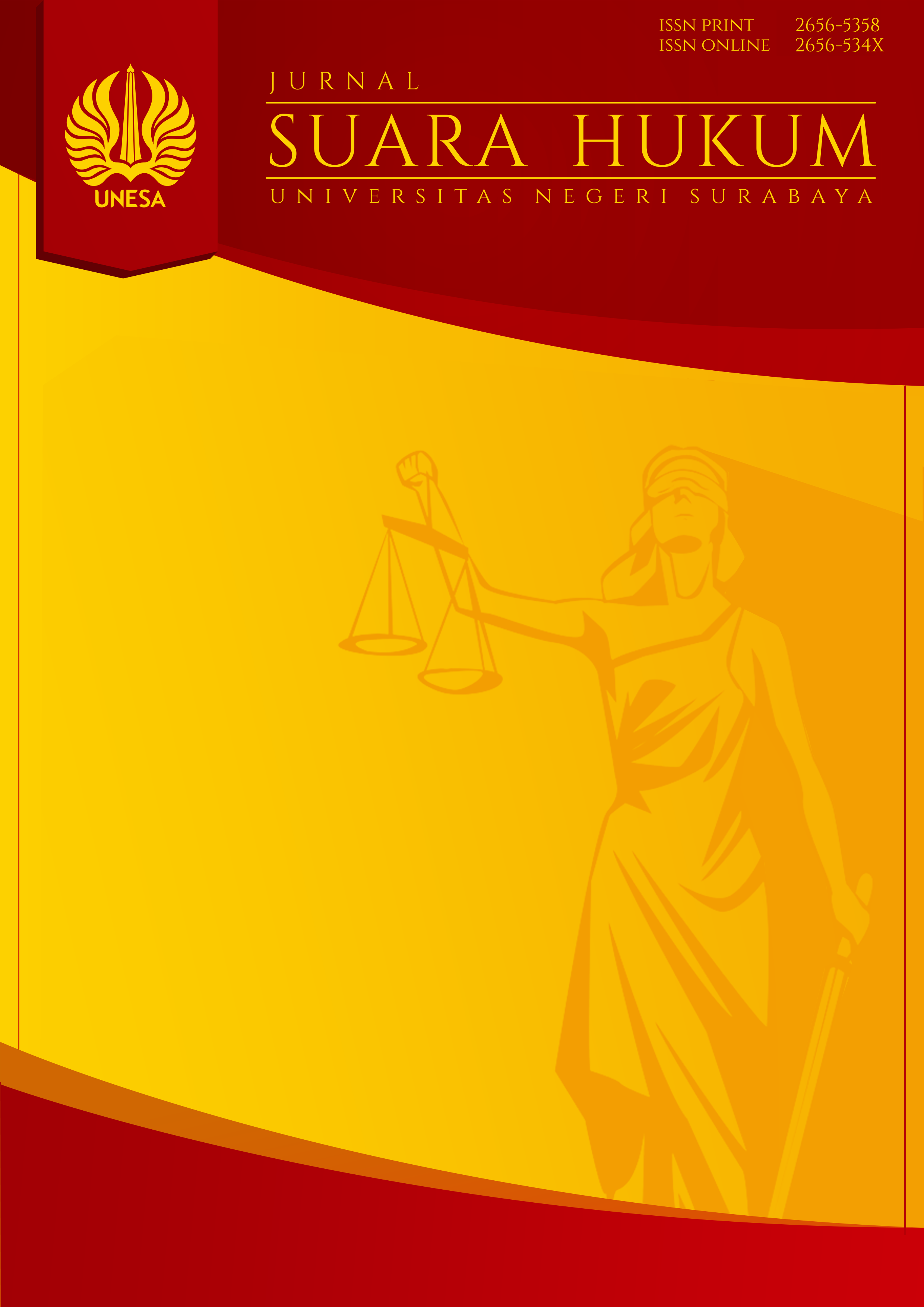Integration of Constitutional Law and Human Rights: A Comparative Study between Indonesia and South Africa
DOI:
https://doi.org/10.26740/jsh.v7n1.p274-297Abstract
The development of the relationship between constitutional law and human rights is fundamental in a rule of law state. Constitutional law is oriented towards regulating and simultaneously striving for the optimal protection of human rights. This research aims to examine the integration between constitutional law and human rights by conducting a comparative legal study between Indonesia and South Africa. This research is a normative legal study emphasizing historical, conceptual, legislative, and comparative legal approaches. The research findings indicate that the strengthening of human rights norms and the role of the Indonesian Constitutional Court have become crucial points, particularly the role and authority of the Indonesian Constitutional Court through its rulings aimed at protecting human rights. Similar developments also occurred in South Africa after the end of apartheid, with the establishment of the Constitutional Court and constitutional reforms as important steps in upholding the rule of law and human rights. The Constitutional Courts of Indonesia and South Africa both face issues such as weak implementation of rulings, political pressure, and slow legislative processes that accommodate the Constitutional Court's decisions. This research recommends that the integration of constitutional law and human rights should be optimized by strengthening the authority of the Constitutional Court, including the authority to ensure that Constitutional Court decisions are obeyed and implemented optimally to protect human rights.
References
Aláez-Corral, B. (2020). Constitutional Amendment and Concept of Constitution. International Journal of Human Rights and Constitutional Studies, 7(2), 1–28.
Atilgan, A. (2018). Global Constitutionalism: A Socio-legal Perspective (1st ed.). Springer Nature.
Aulia, Y., Abdurahman, A., & Susanto, M. (2021). Fundamental Principles of the Legislation Process. Petita: Jurnal Kajian Ilmu Hukum Dan Syariah, 6(1), 41–64. https://doi.org/10.22373/petita.v6i1.109
Basri, A. H. (2024). Implications of Constitutional Court Decision No. 46/PUU-VIII/2010 on the Rights of Children from Marriage Series Islamic Family Law Perspective. Kitabaca: Journal of Islamic Studies, 1(1), 10–26. https://ejournal.kitabaca.id/index.php/kitabaca/article/view/2%0Ahttps://ejournal.kitabaca.id/index.php/kitabaca/article/download/2/2
Botha, C., & Bekink, B. (2018). Law reform in South Africa: 21 years since the establishment of a supreme constitutional dispensation. The Theory and Practice of Legislation, 6(2), 263–289. https://doi.org/10.1080/20508840.2018.1475904
Chidiogo Uzoamaka Akpuokwe, Seun Solomon Bakare, N. E. E., & Adeniyi, A. O. (2024). Corporate Law In The Era Of Globalization: A Review Of Ethical Implications And Global Impacts. Finance & Accounting Research Journal, 6(3), 304–319.
De Beco, G. (2019). the Indivisibility of Human Rights and the Convention on the Rights of Persons With Disabilities. International and Comparative Law Quarterly, 68(1), 141–160. https://doi.org/10.1017/S0020589318000386
Dicky Eko Prasetio, F. P. D. (2021). Politik Hukum Pengujian Formil Terhadap Perubahan Konstitusi. Aktualisasi UUD Negara RI Tahun 1945 Dalam Penyelenggaraan Negara: 23 Tahun Reformasi, 101.
Ed Wensing. (2021). Indigenous peoples’ human rights, self-determination and local governance – Part 1. Commonwealth Journal of Local Governance, 1(24), 98–123. https://doi.org/10.5130/cjlg.vi24.7779
Faiz, P. M. (2019). Amandemen Konstitusi: Komparasi Negara Kesatuan dan Negara Federal (1st ed.). Rajawali Pers.
Hill, J. L. (2020). The Prophet of Modern Constitutional Liberalism: John Stuart Mill (1st ed.). Cambridge University Press.
Holzinger, K., Haer, R., Bayer, A., Behr, D. M., & Neupert-Wentz, C. (2019). The Constitutionalization of Indigenous Group Rights, Traditional Political Institutions, and Customary Law. Comparative Political Studies, 52(12), 1775–1809. https://doi.org/10.1177/0010414018774347
Jahan, R., Uddin, A., Osmani, N. M., & Sulaiman, K. U. (2023). The Role of Women in Achieving Sustainable Development Goals (SDGs) In Islam: An Analysis of Gender Equality and Women Empowerment in the Modern World. Al-Burhān: Journal of Qurʾān and Sunnah Studies, 7(2), 110–124. https://doi.org/10.31436/alburhn.v7i2.329
Johan, T. S. B. (2018). Hukum Tata Negara dan Hukum Administrasi Negara dalam Tataran Reformasi Ketatanegaraan Indonesia (1st ed.). Deepublish.
Koos, S. (2022). Digital globalization and law. Lex Scientia Law Review, 6(1), 33–68. https://doi.org/10.15294/lesrev.v6i1.55092
Lailam, T., Anggia, P., & Irwansyah, I. (2022). The Proposal of Constitutional Complaint for the Indonesian Constitutional Court. Jurnal Konstitusi, 19(3), 693–719. https://doi.org/10.31078/jk1939
Loughlin, M. (2022). AV Dicey and the Making of Common Law Constitutionalism†. Oxford Journal of Legal Studies, 42(1), 366–382. https://doi.org/10.1093/ojls/gqab021
Mahardika, A. G. (2019). Constitutional Convention in Indonesian National Law System After the Reformation. Jurnal Rechtsvinding, 8(April), 55–68. https://rechtsvinding.bphn.go.id/artikel/4. Ahmad Gelora.pdf
Moshikaro, K. (2022). Unjust Contempt as the Gist of Defamation Law. Constitutional Court Review, 12(1), 59–86. https://doi.org/10.2989/ccr.2022.0002
Mubangizi, J. C. (2020). A Human Rights Based Approach to Fighting Corruption in Uganda and South Africa: Shared Perspectives and Comparative Lessons. Law, Democracy and Development, 24, 225–247. https://doi.org/http://dx.doi.org/10.17159/2077-4907/2020/ldd.v24.10
Pattipawae, D. R., Salmon, H., & Lainsamputty, N. (2022). Due To The Legal Non-Compliance of State Administrative Officers With The Implementation of Forced Money (Dwangsom) In The Execution of State Administrative Decisions. Sasi, 28(2), 182. https://doi.org/10.47268/sasi.v28i2.730
Prasetio, D. E. (2024). Politik Hukum Omnibus Law Terkait Cybercrime di Indonesia dalam Perspektif Hukum Progresif. Indonesian Journal Of Law Studies, 3(1), 27–41.
Prasetyo, H. (2021). Restructuring Insurance Policy as an Ultra Vires Action Based on Limited Liability Company Law. International Journal of Social Science and Human Research, 04(07). https://doi.org/10.47191/ijsshr/v4-i7-09
Rofii, A. (2021). The Religiosity Of The Indonesian Constitution: Article 29(1) And Its Interpretation. Constitutional Review, 7(2), 203–240. https://doi.org/10.31078/consrev722
Rudy, R., Natamiharja, R., Serna, J. A. M., & Syofyan, A. (2023). Implementation of Civil Rights against Vulnerable Groups in the Legal and Constitutional System in Indonesia. Hasanuddin Law Review, 8(3), 299. https://doi.org/10.20956/halrev.v8i3.4229
Tusseau, G. (Ed.). (2020). Debating Legal Pluralism and Constitutionalism: New Trajectories for Legal Theory in the Global Age. Springer Nature.
Umami, F., Maududi, A. N., & Mahmudah, A. R. (2022). A Discourse of General Principles of Good Governance in Public Services in Indonesia. Indonesian Journal of Pancasila and Global Constitutionalism, 1(1), 17–32. https://doi.org/10.15294/ijpgc.v1i1.56876
Yunus, N. R., Siagian, A., & Zein, F. (2022). Constitutional Law System in Indonesia and Its Comparison with Other Legal Systems. SALAM: Jurnal Sosial Dan Budaya Syar-I, 9(6), 1837–1858. https://doi.org/10.15408/sjsbs.v9i6.28113
Downloads
Published
Issue
Section
License
Copyright (c) 2025 Andi Sugirman, Jumriani Nawawi, Hamzah, Irfan Amir, Dinesha Samararatne

This work is licensed under a Creative Commons Attribution-NonCommercial 4.0 International License.
 Abstract views: 606
,
Abstract views: 606
, PDF Downloads: 144
PDF Downloads: 144




